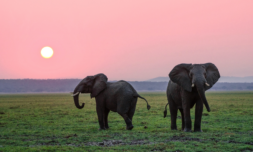When someone mentions deforestation, you probably think of beef production or the wood industry as being most culpable. A key driver that often goes under the radar, however, is organised crime like drug trafficking and illegal logging.
Almost a year on from COP26, there’s definitely work to be done to regenerate 30% of natural land by 2030.
Every 12 months, the world loses an estimated 25 million acres of forest to deforestation. This damage roughly matches the size of the state of Indiana and almost all of it occurs within the tropics.
With hopes of stopping the rot, delegates at the conference committed to halting deforestation within the next eight (now seven) years. The official legislation, called the ‘Declaration on Forests and Land Use,’ outlined a $19bn USD strategy focused on sourcing consumer goods like beef, palm oil, wood pulp, and paper products in a more sustainable way.
Together, these commodities remain responsible for the loss of nearly 12 million acres annually. There is, however, a fifth key driver of deforestation that receives less publicity and attention from global policymakers: organised crime.
How big a role does organised crime play?
If you’re unsure of what money laundering means (and haven’t seen Peaky Blinders), it boils down to making illegal cashflow appear legitimate through the guise of a proper business.
The five focus industries we previously mentioned are regularly used by criminals to disguise earnings and nefarious operations across the globe.
South America and Central America in particular are so rife with drug trafficking rings that they’ve almost become a vanguard of deforestation. Some reports go as far to suggest that between 30 and 60 percent of all such activity is attributed to ‘narco-deforestation.’
Levelling forest land to create space for the rearing of cattle and rapidly expanding logging networks, drug traffickers continue to launder money while concealing cocaine in timber shipments to Europe.
The line between legal and illegal is extremely blurry when it comes to productions of palm oil and soy. A US forest conservation outfit called Forest Trends estimates that nearly half of deforestation for cattle, soy, palm oil, and wood products is illegal.
According to its market research, exports tied to illegal practices could be worth a staggering $61bn every year. Highlighting the scope of the issue, it also suggests they’re responsible for a quarter of tropical deforestation globally.
Not all large-scale illegal deforestation is tied to drug trafficking organisations, but it is almost always tied to organised crime – and, in some cases, corruption. Not to mention, instances of slave labour and exploitation are regularly reported.




















